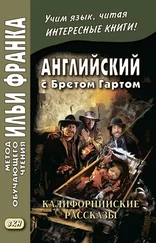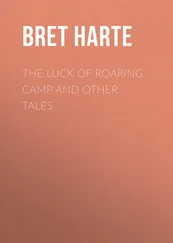Bret Harte - The Bell-Ringer of Angel's, and Other Stories
Здесь есть возможность читать онлайн «Bret Harte - The Bell-Ringer of Angel's, and Other Stories» — ознакомительный отрывок электронной книги совершенно бесплатно, а после прочтения отрывка купить полную версию. В некоторых случаях можно слушать аудио, скачать через торрент в формате fb2 и присутствует краткое содержание. Издательство: Иностранный паблик, Жанр: foreign_sf, literature_19, foreign_antique, foreign_prose, на английском языке. Описание произведения, (предисловие) а так же отзывы посетителей доступны на портале библиотеки ЛибКат.
- Название:The Bell-Ringer of Angel's, and Other Stories
- Автор:
- Издательство:Иностранный паблик
- Жанр:
- Год:неизвестен
- ISBN:нет данных
- Рейтинг книги:4 / 5. Голосов: 1
-
Избранное:Добавить в избранное
- Отзывы:
-
Ваша оценка:
- 80
- 1
- 2
- 3
- 4
- 5
The Bell-Ringer of Angel's, and Other Stories: краткое содержание, описание и аннотация
Предлагаем к чтению аннотацию, описание, краткое содержание или предисловие (зависит от того, что написал сам автор книги «The Bell-Ringer of Angel's, and Other Stories»). Если вы не нашли необходимую информацию о книге — напишите в комментариях, мы постараемся отыскать её.
The Bell-Ringer of Angel's, and Other Stories — читать онлайн ознакомительный отрывок
Ниже представлен текст книги, разбитый по страницам. Система сохранения места последней прочитанной страницы, позволяет с удобством читать онлайн бесплатно книгу «The Bell-Ringer of Angel's, and Other Stories», без необходимости каждый раз заново искать на чём Вы остановились. Поставьте закладку, и сможете в любой момент перейти на страницу, на которой закончили чтение.
Интервал:
Закладка:
Bret Harte
The Bell-Ringer of Angel's
CHAPTER I
Where the North Fork of the Stanislaus River begins to lose its youthful grace, vigor, and agility, and broadens more maturely into the plain, there is a little promontory which at certain high stages of water lies like a small island in the stream. To the strongly-marked heroics of Sierran landscape it contrasts a singular, pastoral calm. White and gray mosses from the overhanging rocks and feathery alders trail their filaments in its slow current, and between the woodland openings there are glimpses of vivid velvet sward, even at times when the wild oats and “wire-grasses” of the plains are already yellowing. The placid river, unstained at this point by mining sluices or mill drift, runs clear under its contemplative shadows. Originally the camping-ground of a Digger Chief, it passed from his tenancy with the American rifle bullet that terminated his career. The pioneer who thus succeeded to its attractive calm gave way in turn to a well-directed shot from the revolver of a quartz-prospector, equally impressed with the charm of its restful tranquillity. How long he might have enjoyed its riparian seclusion is not known. A sudden rise of the river one March night quietly removed him, together with the overhanging post oak beneath which he was profoundly but unconsciously meditating. The demijohn of whiskey was picked up further down. But no other suggestion of these successive evictions was ever visible in the reposeful serenity of the spot.
It was later occupied, and a cabin built upon the spot, by one Alexander McGee, better known as “the Bell-ringer of Angel’s.” This euphonious title, which might have suggested a consistently peaceful occupation, however, referred to his accuracy of aim at a mechanical target, where the piercing of the bull’s eye was celebrated by the stroke of a bell. It is probable that this singular proficiency kept his investment of that gentle seclusion unchallenged. At all events it was uninvaded. He shared it only with the birds. Perhaps some suggestion of nest building may have been in his mind, for one pleasant spring morning he brought hither a wife. It was his OWN; and in this way he may be said to have introduced that morality which is supposed to be the accompaniment and reflection of pastoral life. Mrs. McGee’s red petticoat was sometimes seen through the trees—a cheerful bit of color. Mrs. McGee’s red cheeks, plump little figure, beribboned hat and brown, still-girlish braids were often seen at sunset on the river bank, in company with her husband, who seemed to be pleased with the discreet and distant admiration that followed them. Strolling under the bland shadows of the cotton-woods, by the fading gold of the river, he doubtless felt that peace which the mere world cannot give, and which fades not away before the clear, accurate eye of the perfect marksman.
Their nearest neighbors were the two brothers Wayne, who took up a claim, and built themselves a cabin on the river bank near the promontory. Quiet, simple men, suspected somewhat of psalm-singing, and undue retirement on Sundays, they attracted but little attention. But when, through some original conception or painstaking deliberation, they turned the current of the river so as to restrict the overflow between the promontory and the river bank, disclosing an auriferous “bar” of inconceivable richness, and establishing their theory that it was really the former channel of the river, choked and diverted though ages of alluvial drift, they may be said to have changed, also, the fortunes of the little settlement. Popular feeling and the new prosperity which dawned upon the miners recognized the two brothers by giving the name of Wayne’s Bar to the infant settlement and its post-office. The peaceful promontory, although made easier of access, still preserved its calm seclusion, and pretty Mrs. McGee could contemplate through the leaves of her bower the work going on at its base, herself unseen. Nevertheless, this Arcadian retreat was being slowly and surely invested; more than that, the character of its surroundings was altered, and the complexion of the river had changed. The Wayne engines on the point above had turned the drift and debris into the current that now thickened and ran yellow around the wooded shore. The fringes of this Eden were already tainted with the color of gold.
It is doubtful, however, if Mrs. McGee was much affected by this sentimental reflection, and her husband, in a manner, lent himself to the desecration of his exclusive domain by accepting a claim along the shore—tendered by the conscientious Waynes in compensation for restricting the approach to the promontory—and thus participated in the fortunes of the Bar. Mrs. McGee amused herself by watching from her eyrie, with a presumably childish interest, the operations of the red-shirted brothers on the Bar; her husband, however, always accompanying her when she crossed the Bar to the bank. Some two or three other women—wives of miners—had joined the camp, but it was evident that McGee was as little inclined to intrust his wife to their companionship as to that of their husbands. An opinion obtained that McGee, being an old resident, with alleged high connections in Angel’s, was inclined to be aristocratic and exclusive.
Meantime, the two brothers who had founded the fortunes of the Bar were accorded an equally high position, with an equal amount of reserve. Their ways were decidedly not those of the other miners, and were as efficacious in keeping them from familiar advances as the reputation of Mr. McGee was in isolating his wife. Madison Wayne, the elder, was tall, well-knit and spare, reticent in speech and slow in deduction; his brother, Arthur, was of rounder outline, but smaller and of a more delicate and perhaps a more impressible nature. It was believed by some that it was within the range of possibility that Arthur would yet be seen “taking his cocktail like a white man,” or “dropping his scads” at draw poker. At present, however, they seemed content to spend their evenings in their own cabin, and their Sundays at a grim Presbyterian tabernacle in the next town, to which they walked ten miles, where, it was currently believed, “hell fire was ladled out free,” and “infants damned for nothing.” When they did not go to meeting it was also believed that the minister came to them, until it was ascertained that the sound of sacred recitation overheard in their cabin was simply Madison Wayne reading the Bible to his younger brother. McGee is said to have stopped on one of these occasions—unaccompanied by his wife—before their cabin, moving away afterwards with more than his usual placid contentment.
It was about eleven o’clock one morning, and Madison Wayne was at work alone on the Bar. Clad in a dark gray jersey and white duck trousers rolled up over high india-rubber boots, he looked not unlike a peaceful fisherman digging stakes for his nets, as he labored in the ooze and gravel of the still half-reclaimed river bed. He was far out on the Bar, within a stone’s throw of the promontory. Suddenly his quick ear caught an unfamiliar cry and splash. Looking up hastily, he saw Mrs. McGee’s red petticoat in the water under the singularly agitated boughs of an overhanging tree. Madison Wayne ran to the bank, threw off his heavy boots, and sprang into the stream. A few strokes brought him to Mrs. McGee’s petticoat, which, as he had wisely surmised, contained Mrs. McGee, who was still clinging to a branch of the tree. Grasping her waist with one hand and the branch with the other, he obtained a foothold on the bank, and dragged her ashore. A moment later they both stood erect and dripping at the foot of the tree.
“Well?” said the lady.
Wayne glanced around their seclusion with his habitual caution, slightly knit his brows perplexedly, and said: “You fell in?”
Читать дальшеИнтервал:
Закладка:
Похожие книги на «The Bell-Ringer of Angel's, and Other Stories»
Представляем Вашему вниманию похожие книги на «The Bell-Ringer of Angel's, and Other Stories» списком для выбора. Мы отобрали схожую по названию и смыслу литературу в надежде предоставить читателям больше вариантов отыскать новые, интересные, ещё непрочитанные произведения.
Обсуждение, отзывы о книге «The Bell-Ringer of Angel's, and Other Stories» и просто собственные мнения читателей. Оставьте ваши комментарии, напишите, что Вы думаете о произведении, его смысле или главных героях. Укажите что конкретно понравилось, а что нет, и почему Вы так считаете.












